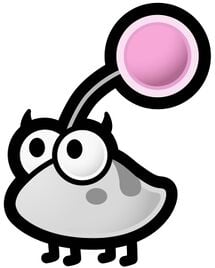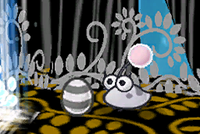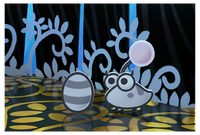Petuni
- Not to be confused with Petunia.
| Petuni | |
|---|---|
 Artwork from Paper Mario: The Thousand-Year Door | |
| Species | Puni |
| First appearance | Paper Mario: The Thousand-Year Door (2004) |
| Latest appearance | Paper Mario: The Thousand-Year Door (Nintendo Switch) (2024) |
- “OK, big brother! I'll be waiting.”
- —Petuni, Paper Mario: The Thousand-Year Door
Petuni is a character who appears in Paper Mario: The Thousand-Year Door. She and her older brother Punio are members of the Puni tribe Mario encounters during the events of chapter two of the game. Petuni's name is a portmanteau of "Puni" and "petunia", a type of flower.
History
Prior to the events of chapter two, Petuni lived a normal life with the other Punies. During that time, she went for a walk in Boggly Woods to find a Mushroom as a present for her older brother. However, the Punies' home, a Great Tree in the woods, was eventually infiltrated and taken over by the X-Nauts who were searching for the Emerald Star. During the overtake, Petuni's brother Punio escaped from the intruders and went to get assistance. After the X-Nauts conquered the tree, they attempted to get information about the whereabouts of the Crystal Star out of the Puni elder, but the elder refused to tell them anything, and so Petuni, along with the elder and several other Punies, were imprisoned in an iron cage.
The player enters the events when Mario arrives with Punio. Punio is shocked when he learns that his sister has disappeared, but quickly finds out that she has merely been taken away and is relieved after he sees that she is unharmed. Mario and Punio eventually manage to set her and the other Punies free by finding a Blue Key. In the following reunition scene, Petuni gives Punio the Mushroom she picked earlier, which has dried out and regressed to a Dried Mushroom since that time. She is ashamed at the fact, but Punio simply eats the Mushroom and tells her that it is fine. Petuni and the other Punies then join Mario's party and fight by his side to reclaim their home from the X-Nauts.
After Mario and the Punies have managed to drive the X-Nauts out of the Great Tree, Petuni and the others return to their daily lives. Petuni can be found next to a creek inside the entrance area of the tree. She is terribly bored because her brother cannot play with her. If Mario decides to play a game called Stump Petuni with her, he can receive a Mystic Egg from Petuni's egg collection. Petuni also sends an email to Mario, in which she wishes for him to come play with her.
Petuni is seen later in the cutscene during Mario's fight with the Shadow Queen. Along with the other Punies, she prays to the Emerald Star for Mario's and Flurrie's success. After that, Petuni is seen one last time when Mario is about to leave Rogueport. Petuni and her brother come to the harbor shortly before the boat arrives and present fresh Mushrooms to Mario and Princess Peach.
Another appearance of Petuni occurs during the events of Super Paper Mario. Although she does not appear personally, she can be spotted on a Poster in Fort Francis, like various other characters.
- Yoo hoo!
Hi, Mario!
How are you? I'm, uh...good. No, VERY good! No!!! GREAT!!! (GameCube)
How are you? I'm, uh...good. No, VERY good! No! GREAT! (Switch)
Lots of stuff has changed here. Oh, but not the elder being mad at my brother. That's still the same.
I do wish you'd come back to play sometime. Are you really busy? Are you going someplace far away? Like, a place nobody's ever been? Wow! That'd be FUN! I'm jealous!
Well, if you ever have time to come back here, come play with me, OK? You have to PROMISE!
From, Petuni
Appearance
Petuni looks similar to her fellow Punies, being rather small and having a vaguely oval shaped, light gray body. To be able to walk around, she possesses four comparatively small legs. On her back she sports several dark gray dots, and an antenna is attached to her forehead, which ends in a pink glowing orb. A notable quirk in her appearance are her eyelashes which serve to indicate her gender.
Personality
Petuni has a close relationship to her older brother Punio, as shown in several instances during the game. He seems to be her main attachment figure, which is implied by the fact that she is bored when he is not with her, even if many other Punies would gladly spend time with her. She is on good terms with the other members of her tribe though, which is shown by the great amount of respect and appreciation she receives from other Punies and even some Jabbies. Like all Punies, she is depicted as childlike and innocent, although she seems to have no problem with fighting the Jabbi tribe like her fellow tribe members. She likes to collect eggs.
Tattle information
- That's Punio's sister, Petuni. She really cares about her brother. I mean, you can just FEEL her love for him! I feel totally awful that's she's all trapped in here. Let's hurry up and help her and the rest of them, OK?
- That's Petuni, Punio's sister. She really trusts her brother. Let's hurry up and get her out of here. Oh and all of the others too.
- That's Petuni of the Punies. She's Punio's little sister. I hope they can all live peacefully together now, don't you?
Gallery
Names in other languages
| Language | Name | Meaning | Notes |
|---|---|---|---|
| Japanese | プニコ[?] Puniko |
Portmanteau of "Puni" and「子」(ko, "child"), a suffix common in Japanese female names | |
| Chinese | 普尼珂[?] Pǔníkē |
Transliteration of the Japanese name | |
| Dutch | Christini[?] | From the name "Christina" and "mini" or Ini ("Puni") | |
| French | Pounita[?] | From Pouni ("Puni") and the feminine name ending "-ita" | |
| German | Bubulia[?] | Portmanteau of Bubu ("Puni") and the female name "Julia" | |
| Italian | Fufulvia[?] | Portmanteau of Fufino ("Puni") and the female name "Fulvia" | |
| Korean | 말랑양[?] Mallang-yang |
? | |
| Spanish | Punílope[?] | Portmanteau of "Puni" and the female name "Penélope" |











